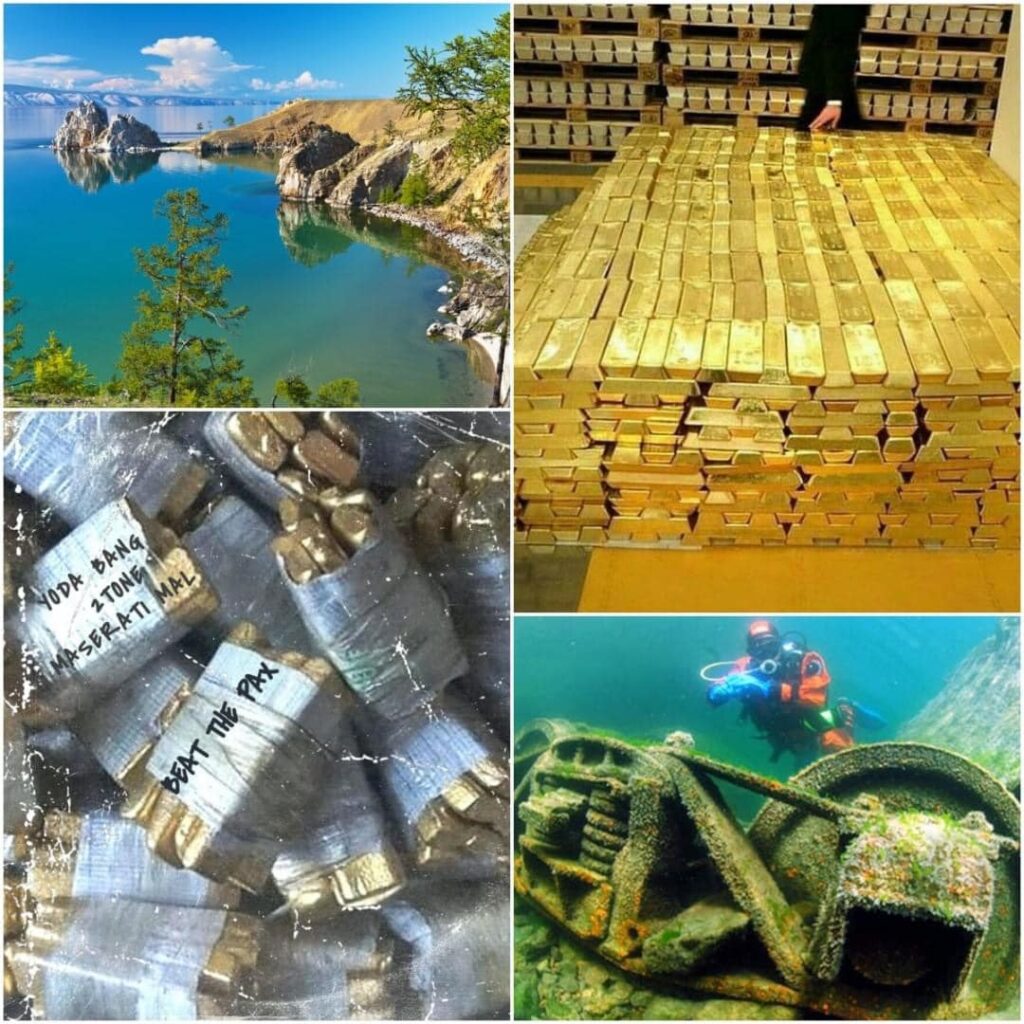Legend has it that a massive fortune of 1,600 tons of gold has been resting undisturbed at the depths of Lake Baikal for centuries, creating a captivating mystery. Despite the widespread fascination with this hidden treasure, no one has dared to unravel its secrets. The Guinness Book of Records has proudly hailed Lake Baikal in Russia as the world’s deepest lake, boasting an expanse equal to that of Belgium and holding a staggering 20% of the Earth’s fresh water. Due to its unique and awe-inspiring qualities, this extraordinary location has earned various monikers like “World Fountain,” “Moon Lake,” “Beihai,” “Russian Pearl,” and “Lake of Countless Mysteries.”

Lake Baikal in Russia is renowned for being the deepest lake in the world. This pristine lake holds many secrets that only a few are aware of, making it a magnet for avid explorers. During the winter, Lake Baikal transforms into a breathtaking icy wonderland, surrounded by vast and picturesque landscapes.
The expansive lake, coupled with the endless snow-capped mountains, offers a truly mesmerizing sight. Numerous legends swirl around Lake Baikal, with the most intriguing one being the tale of up to 1,600 tons of gold lying at the bottom of this unparalleled body of water.

In 1917, during the downfall of Tsar Nicholas II, a group of noblemen attempted to escape Russia with a massive amount of gold and silver treasures. As they crossed Lake Baikal, they were pursued by enemies, forcing them to abandon 1,600 tons of gold to sink to the lake’s bottom.
Another tale suggests that this gold belonged to Tsar Nicholas II himself. While transporting the gold to a new hiding place, a sudden thaw caused the group to sink with the 1,600 tons of gold in Lake Baikal.
Despite these stories, the mystery remains as to why no one has attempted to retrieve this immense amount of gold from the lake.

The primary reason for the difficulty in salvaging gold from Lake Baikal is attributed to its structure and location. According to reports from individuals familiar with the area, the lake reaches a depth of 1,637 meters and holds over 2.36 billion cubic meters of water. The challenging conditions make any rescue mission nearly unattainable.
Lake Baikal is situated at a convergence of seismic faults. It experiences earthquakes of around magnitude 6 on the Richter scale every decade, with catastrophic earthquakes of about magnitude 9 occurring roughly every 30 years. Historical records document significant earthquakes in 1862 and 1959, including a magnitude 9.5 earthquake in 1960 that significantly impacted the lake’s surroundings and water levels.
Despite the legendary tales, nobody has successfully recovered the vast amount of gold rumored to be in Lake Baikal. The second reason for the difficulty lies in the presence of various freshwater species from the Tertiary period, such as Baikal seals, Arctic white trout, Omul white trout, and even sharks. The potential treasure hunter abandoned the quest upon learning about the significant ecological damage such an expedition could cause.
Human activities affecting the lake’s environment could result in considerable harm to its biological, plant, and mineral resources. This impact may have lasting repercussions for humanity both presently and in the future.

There are numerous travelers who come to visit the lake.
A significant question arises when considering the possibility of finding gold during the extraction process: to whom does this valuable resource belong? Lake Baikal was designated as a World Natural Heritage site in 1996, suggesting that it belongs to all of humanity. However, the indigenous people living in the vicinity of the lake are in the minority in Irkutsk. Furthermore, Lake Baikal spans both the Republic of Buryatia and the Irkutsk Oblast, making it difficult to determine a singular owner for the entire lake.
Local residents surrounding Lake Baikal often share stories of witnessing remarkable scenes on the lake, ranging from castles to trains and boats. According to legend, Tsar Nicholas II is believed to be the possessor of the rumored gold reserves stored in the lake.
Folklore depicts Lake Baikal as being under the protection of a divine power capable of bestowing immortality. This belief prompts many individuals to endure the frigid waters of the lake, with temperatures as low as 5 degrees Celsius, in pursuit of eternal life.
The lake has also been a subject of numerous reports involving UFO sightings and mysterious incidents. Intriguingly, accounts of UFO encounters in the area stem from classified Soviet Navy documents. One such document from 1982 details a Russian Navy diver’s encounter with “humanoid creatures in silver suits” at a depth of 50 meters, resulting in the deaths of three divers and injuries to four others.

Visual Representation
Regardless of whether this assumption holds any truth or what lies behind the enigmas surrounding the lake, the lack of advancement in science and technology has prevented anyone from daring to begin a search. The substantial quantity of gold has settled deep within the lakebed.




